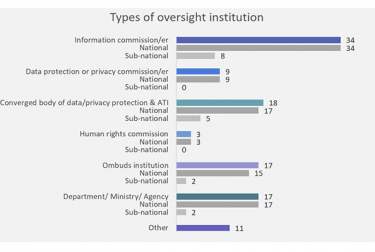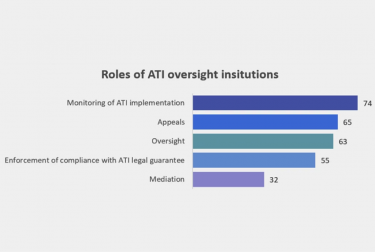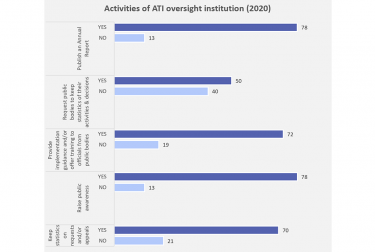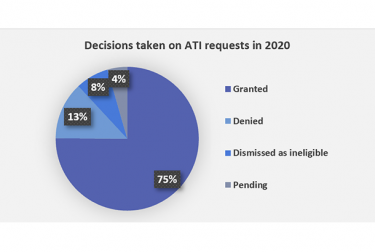Dedicated ATI oversight institutions are well established

Key findings
specifies the need of a dedicated oversight institution(s)
is the most common type of ATI oversight institution
An oversight institution refers to the institution charged with ensuring the process of supervision, monitoring, evaluation of performance and review, in order to ensure compliance with laws, regulations and policies. It therefore ensures accountability for the implementation of ATI. The same body or another may also do appeals, although hearing appeals is a distinct function from oversight and is sometimes done by a separate body. This is why some countries, there exists more than one oversight institution, depending on the different tasks performed.
Out of the 91 responding countries and territories with ATI guarantees, 87% (79) reported that their respective ATI legal guarantee specifies the need of a dedicated oversight institution(s). Information Commission/er is the most common type (34), followed with a converged body that combines data/privacy protection and ATI (18); Ombuds institution (17) and Department/ Ministry/ Agency (17); Other (11) [1]; Data protection or privacy commission/er (9); and Human Rights Commission (3). [2] In the majority of countries and territories, these institutions operate at the national level, with only few of them indicating the existence at the sub-national level.

When it comes to the roles of the ATI oversight institutions as mandated by the guarantees, the majority of countries and territories responded ‘Monitoring of ATI implementation’ (74), followed with ‘Appeals’ (65); ‘Oversight’ (63); ‘Enforcement of compliance with ATI legal guarantee’ (55) and ‘Mediation’ (32).[3] ‘Mediation’ seems like the most uncommon role, but it is interesting to note that 50% of respondents in Africa (7 out of 15) and Latin America and the Caribbean (10 out of 20) reported on this role, indicating a small tendency in these regions to propose an alternative solution to resolve a dispute before proceeding to any formal procedure.

On the question about the activities performed by the dedicated ATI oversight institutions in 2020, publishing an annual report was reported by 78 countries and territories. The same number of respondents also reported that they sensitised the public on Access to Information. The third activity implemented by ATI oversight institutions was providing a guidance to officials from public bodies (72), followed by keeping statistics on request and appeals (70) and requesting public bodies to keep statistics on their activities and decisions.
However, there is a caveat here. Some countries and territories that reported on keeping statistics did not provide further data to UNESCO in their response to the following questions. On the contrary, few others reported that they did not keep statistics, but nevertheless still provided data. This reflects some inconsistencies in record-keeping practices.

It remains crucial to assess, both qualitatively and quantitatively, the implementation of this right. One indicator that can help monitor this effectiveness is the availability of data on the number of requests received and how they were treated.
Out of the 91 countries and territories with ATI laws, only 44% (40) had data in 2020 on the number of requests for information received. The remaining 56% (51) only had data from either 2018 or 2019, or no data at all. Of the latter, it is important to note that some did report having a data collection mechanism. The low number of data availability in 2020 might indicate some difficulties faced by public bodies to treat and follow up ATI requests during the pandemic.
From the data available in 2020 as reported by the 40 countries and territories, the majority of ATI requests were granted (75% of cases) and only 13% were denied, with the remainder being dismissed as ineligible[4] (8%) and pending (4%). This positive trend indicates the effectiveness of these jurisdictions in implementing ATI guarantees. However, it is worth noting that some countries recorded gaps in terms of the number of total requests received and their breakdowns in relation to UNESCO’s categories of decision. In this case, some countries explained that they adopted different manners in treating the requests. For instance, requests made by robots and those withdrawn by the requestors were not included in their follow-up systems, as was the case for requests transferred to sub-national level. In some other instances, the cases that were treated in 2020 were actually carried over from the previous year(s). This resulted in differences between the total number of decisions made and the total number of requests received.

[1] Some countries and territories that opted for ‘Other’ indicated they have more than one institutions that carry out the oversight mechanism, which cannot be precisely put under any of the survey’s categories. Italy, for instance, mentioned “Ombudsman for local administration and Commission for the access to public document-Public Administration Government Department, while Austria noted “Administrative Courts, Highest Administrative Court, Constitutional Court, Ombudsman Board”. Peru referred ‘Other’ to “la Autoridad Nacional de Transparencia y Acceso a la Información Pública (ANTAIP) and el Tribunal de Transparencia y Acceso a la Información Pública (TTAIP) – both of which are part of the organic structure of the Ministry of Justice and Human Rights. Meanwhile, Bulgaria indicated “Administrative Reform Council”; France “Conseil d'Etat, juridictions administratives”; Serbia “Commissioner for Information of Public Importance and Personal Data protection”; Turkey “The Review Board of Access to Information”; and Uruguay “Unidad de Acceso a la Información Pública (UAIP)
[2] For this question, respondents could choose one or more types, as applicable.
[3] For this question, respondents could choose one or more types, as applicable. It is worth noting that although the survey uses the term ‘oversight institution’ to cover different entities responsible for ATI, some countries in reality put a more specific distinction between an ‘oversight institution’ and a ‘supervisory institution’, hence they did not choose the ‘oversight’ role in their answer to this question.
[4] In some countries, a request for information could not be upheld due to reasons other than “legal exemptions/ exceptions”. This can therefore be categorised as “Dismissed as ineligible”, and could include the following: incomplete applications; vexatious or repeated requests; information not in possession; information already in the public domain; requests submitted to entities other than public bodies or other bodies as permissible by law.


